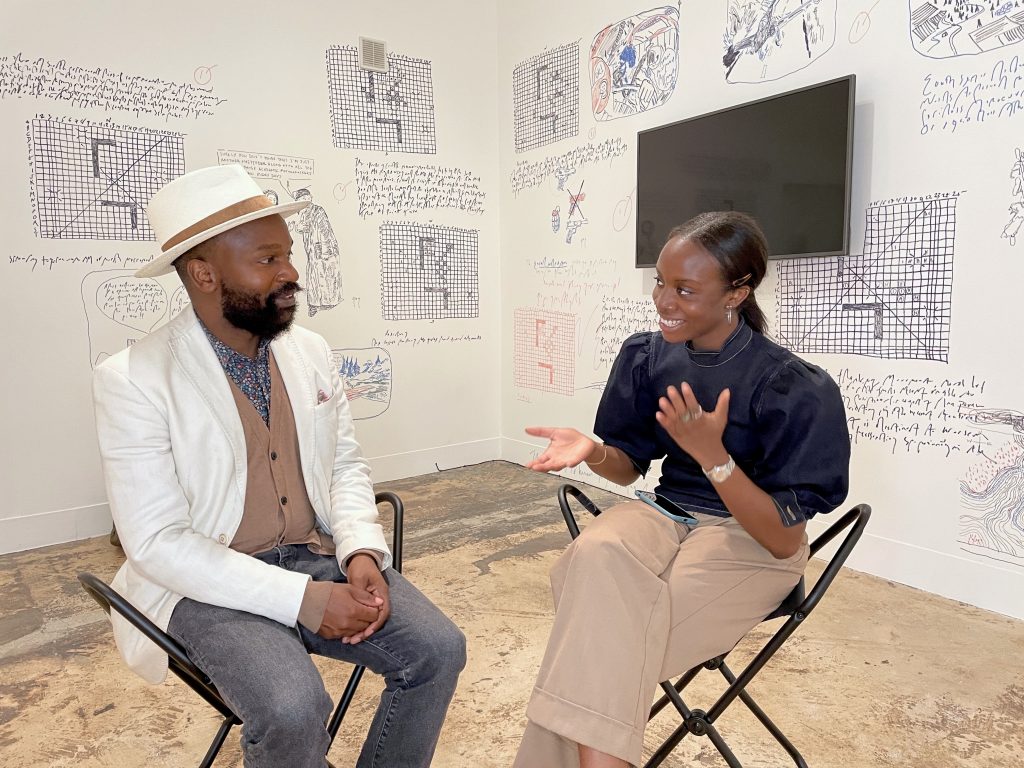We know that exploring, sharing and celebrating the impact of Black heritage and culture is vital all year round. But Black History Month is also a valuable opportunity for individuals, communities, organisations and leaders to come together to keep educating, questioning and change-making. This year, we’ve especially enjoyed hearing the voices of students who have joined us to speak about Black history across the education system, within arts and culture, and across society and the world at large. Below are just three of many incredible highlights from the year.
Celebrating A Black History of Art with Alayo Akinkugbe
As the founder of @ablackhistoryofart on Instagram, Alayo Akinkugbe highlights Black artists and makers in response to her “frustration at the lack of Black representation” in her own art history degree. Earlier this year, Alayo came to interview Samson Kambalu, the Malawian artist and Oxford University professor whose major solo exhibition at the gallery, New Liberia explored the creation of an initiation ceremony for a utopia of international racial justice. The pair’s thoroughly enjoyable and wide-ranging conversation touches upon Alayo’s concern about low representation of Black artists in the curriculum and Kambalu reveals the personal impact the Black Lives Matter movement has had on his life and work as an artist and professor. Watch the interview below, or on our YouTube channel.
Film-making as a force for change with City as Studio’s Abigail
During our 2021 City as Studio online residencies, young artists created works about the issues they cared about through learning DIY film-making techniques. This short film by Abigail centres on the importance of Black history in education, using interviews with the writer and activist James Baldwin, stop motion animation and DIY sign-making. Currently, students across the UK are not being taught Black British History consistently as part of the national curriculum, despite numerous findings demonstrating its importance. The Black Curriculum are an important organisation, working to deliver Black British history education across the UK across virtual and in-person programmes in schools, youth groups and corporations. Their curriculum is grounded in the arts, to encourage young people to engage with history imaginatively, creatively and critically.
Watch Abigail’s short film below, or on our YouTube channel. Discover the work of The Black Curriculum on their website.
Challenging the institution with students from Ruskin School of Art
Art has the power to creatively challenge historical injustices, to reveal untold histories, and to begin to dismantle the racist structures upheld by historically prestigious institutions. A number of Ruskin School of Art students were closely involved in the process of creating the two large elephants in Samson Kambalu’s exhibition, New Liberia. The sculptures were inspired by the curious practice of ‘détournement’, a creative act that seeks to transform artworks by disfiguring them, an idea first conceived by the avant-garde art group, The Situationists. The sculptures were crafted from over forty Oxford University gowns, cut up and re-assembled. Kambalu invited students to assist him in this collective creative act, that challenged and upturned the historic symbolism of “an academic gown that projects an imperial prestige in the guise of academic excellence.” You can watch students in our behind-the-scenes video of the making of Samson Kambalu’s elephants. Watch below, or visit our YouTube channel.
